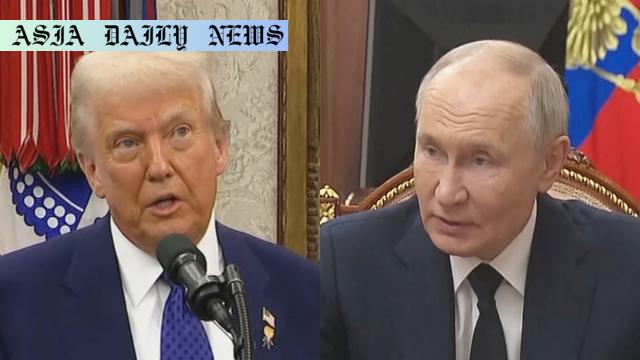Denuclearization appeals intensify as Nobel-winning groups urge the US and Russia to eradicate nuclear weapons and foster peace.
Nobel laureates Nihon Hidankyo, ICAN, and IPPNW urge disarmament.
Letter sent to Trump and Putin advocates nuclear elimination.
Organizations emphasize political will to end nuclear weapons.

Simplified Solutions for Global Denuclearization
Recently, a collaborative effort involving Nobel laureates Nihon Hidankyo, the International Campaign to Abolish Nuclear Weapons (ICAN), and International Physicians for the Prevention of Nuclear War (IPPNW) has sought immediate, decisive action against nuclear weapon production and dependency. These organizations, united by their pursuit of global peace, have addressed US President Donald Trump and Russian President Vladimir Putin, urging them to take collective steps towards the complete eradication of nuclear weapons.
The timing of this appeal is crucial, as preparations for the Treaty on the Non-Proliferation of Nuclear Weapons (NPT) meeting in New York underscore its relevance. Historically, NPT has been a cornerstone in promoting nuclear disarmament, with nations agreeing to curb the spread of nuclear technologies for military use while fostering peaceful developments. Unfortunately, the current geopolitical climate reflects heightened instability, with recurring talks of nuclear proliferation and reliance on deterrence policies.
Significance of Nobel Laureates’ Involvement
Nihon Hidankyo, awarded the Nobel Peace Prize in 2017, underscores the humanitarian devastation wrought by nuclear weaponry during World War II. ICAN, honored in 2017, has consistently advocated for the comprehensive prohibition of such weapons. IPPNW, another influential group awarded in 1985, emphasizes its commitment to global health and safety, highlighting the catastrophic effects nuclear arsenals have on human survival and environmental stability. Their collaboration amplifies core appeals, providing not just symbolic but actionable momentum in addressing the crisis.
Incongruity Between Policy Rhetoric and Reality
Both the United States and Russia have openly alluded to aspirations for a nuclear-free world. However, despite verbal commitments and acknowledgment of the spiraling costs associated with maintaining nuclear arsenals, tangible actions remain elusive. Financial resources that could empower health, education, and environmental rehabilitation are frequently diverted to ensuring military supremacy.
The letter emphasizes the untapped opportunity for disarmament to catalyze socio-economic progress. It reiterates a powerful message: humanity created nuclear weapons, and humanity also holds the capacity to dismantle them.
The Political and Ethical Imperative
The organizations’ letter reiterates the central premise: only political will separates humanity from achieving denuclearization. Governments must prioritize humane policies over deterrence strategies and demonstrate accountability towards their citizens and the global community. The devastating consequences of nuclear warfare are not confined to specific geographies but threaten humanity’s collective existence.
What is evident from this appeal is the need for inclusivity in the decision-making process. Political leaders, scientists, activists, and global citizens must collaborate, ensuring equity and transparency in discussions around nuclear disarmament.
A Call for Global Unity and Responsibility
As humanity advances into an era of unprecedented technological progress, the moral burden intensifies for leaders to align their policies with people-centric goals. The alternative—indifference or procrastination—only prolongs risks, with irreversible consequences. This call from Nobel laureates is not merely a recommendation but an appeal to uphold principles of peace, collaboration, and foresight.



Commentary
Why Denuclearization Demands Global Unity
The recent collaborative appeal from Nobel Peace Prize-winning organizations represents more than a rhetorical entreaty. It symbolizes a necessary pivot from reactive strategies to proactive global peace efforts. Nuclear disarmament is no longer a distant utopian dream but an essential pursuit for human survival. Based on historical lessons and ongoing geopolitical developments, this call comes at a pivotal time when political fragmentation threatens long-term peace prospects.
Bridging Leadership Divides
For decades, nations like the United States and Russia have jockeyed for power, heavily investing in nuclear capabilities to maintain a power equilibrium. While these investments reinforce perceived security, they simultaneously perpetuate a costly and dangerous arms race. Ensuring a shift requires leaders not only to acknowledge mutual responsibilities but to meet with the intention of creating actionable pathways towards denuclearization.
The Role of Public and Civic Advocacy
Public advocacy plays a pivotal role in keeping governments accountable. The letter submitted by Nihon Hidankyo, ICAN, and IPPNW underscores how civil movements can elevate critical issues into mainstream political discourse. Decisions affecting global security should not remain isolated to elite political narratives but involve collective civic participation. Only through sustained and widespread advocacy can momentum for lasting changes in defense policies materialize.
Conclusion: The Moral Imperative
Humanity’s journey beyond the nuclear age requires bold, grace-filled leadership. It is the collective moral responsibility of every generation to prioritize life over conflict, and future welfare over fleeting dominance. Let this moment serve as an inflection point, where talks of denuclearization transition into meaningful actions. No task is too daunting where political will and global unity intersect.